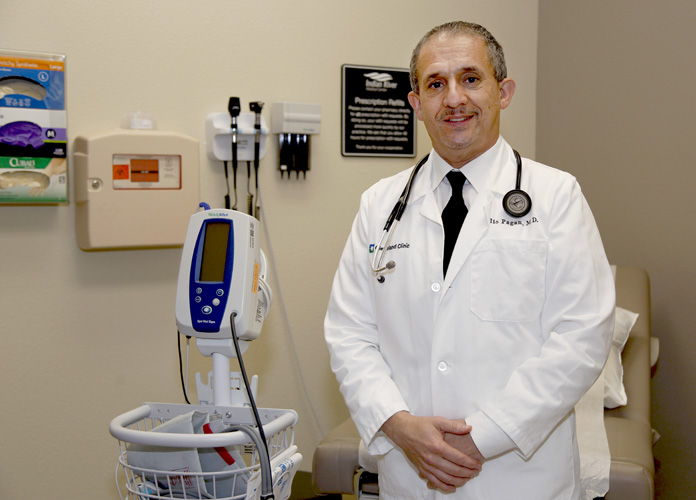
Dr. Julio Pagan, an internal medicine specialist at the Cleveland Clinic Indian River Hospital’s Primary Care South location just off Oslo Road, says high blood pressure is “the most common medical problem that patients have in this country and it predisposes you to heart disease and to strokes, and those are the two leading causes of death in this country. So, it’s an important topic.”
Pagan says he sees “a lot of misconceptions” about how high blood pressure should be treated.
The CDC is blunt about this particular problem and it wholeheartedly agrees with Pagan’s assessment, saying “high blood pressure increases the risk for heart disease and stroke,” and adds that “tens of millions of adults in the United States have high blood pressure and many do not have it under control.”
High blood pressure can be the result of excess salt in your diet, smoking, drinking, obesity or a combination of factors. Or, as unfair as it seems, you might have inherited your high blood pressure.
And, as the Harvard Medical School says, “if you didn’t have high blood pressure before, there’s a good chance you do now.”
That’s because “in 2017, new guidelines from the American Heart Association, the American College of Cardiology, and nine other health organizations lowered the numbers for the diagnosis of hypertension to 130/80 millimeters of mercury (mm Hg) and higher for all adults. The previous guidelines set the threshold at 140/90 mm Hg for people younger than age 65, and 150/80 mm Hg for those ages 65 and older.”
With that change, 70 percent to 80 percent of men age 55 and older were suddenly classified as having hypertension.
In that context, the refreshingly candid Pagan takes aim at what he sees as medical misinformation about water intake.
“There is this medical myth,” he says, “that we have to drink eight glasses of water a day to keep our kidneys healthy. And that’s a medical myth. [That much water] raises the intravascular volume, which can therefore lead to increased blood pressure. It also tends to stimulate appetite, so a lot of patients’ blood pressure tends to parallel [their] weight.
“As the weight goes up, the blood pressure tends to go up. So whether you’re trying to lose weight or whether you’re trying to keep the blood pressure under control, I try to talk about keeping the fluid intake to what’s needed to swallow your food or medications and replace any losses through sweating or excessive loss, [like] diarrhea, for instance. But outside of that, I see a lot of patients who drink more water than they really need to.”
Not drinking more than you need to, Pagan points out, also applies to alcohol.
Yes, years ago researchers found that drinking red wine might have a beneficial impact on blood pressure but that wasn’t a prescription to guzzle a whole bottle at one sitting. And not all alcohol, it seems, is created equal.
“There’s a difference,” Pagan says, “between wine versus mixed drinks versus beer. The mixed drinks tend to raise blood pressure more. But, again, a glass of wine actually may have a lowering blood pressure effect as a mild diuretic. Beer tends to raise intravascular because you have to drink so much of it to get some sort of effect. But a little bit of wine is OK.
“A little bit of wine also raises the HDL, the good cholesterol. So, we don’t encourage drinking as a way of controlling blood pressure, but in small amounts, certain types of alcohol, particularly red wine, seems to be all right. While we don’t totally understand why, we do see fewer heart attacks in patients who have less than 2 ounces of wine a day.”
Pagan next addressed the topic of blood pressure medicines, offering extensive explanations about what angiotensin receptor blockers (ARBs), Angiotensin-converting enzyme (ACE) inhibitors and other medications can and cannot do to help control blood pressure.
He calls ARBs as well as ACE inhibitors the “preferred blood pressure medicines for mild to moderate hypertension, because they do seem to preferentially protect the heart and the kidney from heart failure or kidney failure,” two common complications of high blood pressure.
At the same time, he cautions there’s no such thing as a one-type-fits-all medication, so people need to talk to their physician to find the best medication or medications for their specific blood pressure problem.
A chat with an internal medicine specialist like Pagan might well be the best first step in getting – and then keeping – your blood pressure under control.
Dr. Julio Pagan is with the Cleveland Clinic Indian River Hospital’s Primary Care South at 4165 9th Street SW, Suite 106 in Vero Beach in the Public shopping center on Oslo Road. The phone number is 772-569-7706.



